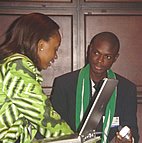The successful KenGen IPO has strenghthened Kenya's ability to domestically finance projects, Peter Munaita writes about the spillover effects across their fixed income markets:
In April investors put down Ksh26 billion ($361 million) for the initial public offer by the Kenya Electricity Generating Company (KenGen) which was oversubscribed by Ksh18 million ($250,000)..."this"...opened the door for corporations like the Kenya Pipeline Company, Kenya Airports Authority, the Kenya Ports Authority, the Kenya Roads Board and the Kenya Railways Corporation to sell their creditworthiness to investors...The optimism about the success of infrastructure bonds follows the successful flotation of similar instruments by cash-rich corporates, the latest being the second tranche of Shelter Afrique's Ksh500 million ($6.9 million) medium term note arranged by Stanbic Bank. Shelter Afrique raised Ksh200 million ($2.8 million) from the market in January on a floating rate basis to finance housing development in the country. The company finances developers with medium term loans to build housing, creating a vital link between individual borrowers and mortgage lenders.
via The East African








